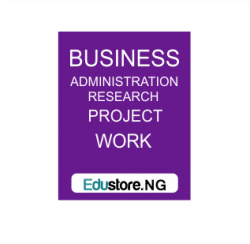ABSTRACT
This research wok specially studied the effect of conflict management on organisational performance. It objectives is to find ways which these conflict can be resolved, reduce in an organisation and also finding ways at which conflict can be minimized. The researcher in the course of the research issued questionnaires and used other methods to gain accurate data and the research took an exploratory form to identify the real nature of problems and formulation of relevant hypothesis test. This method is used because better assessment and analysis could be made when those who are directly involved are used for the study. Probability, sampling method was used as sample size was obtained since the population is a large one. In the findings, it was discovered that there was a good industrial relations atmosphere. In conclusion, good industrial relation atmosphere is conducive in the reduction of conflict in well organized grievance handling procedure. The researcher recommends that proper training should be given to the employee and employers on how to manage conflict as this can be very beneficial. The researcher also recommend that the management should try and be flexibly in all interactions with members of the organisation and also be trained in the act of managing conflict as this will improve workers performance and efficiency of the entire organisation.
CHAPTER ONE
INTRODUCTION
1.1 Background to the Study
Conflict is generally regarded as a disagreement regarding interest or ideas (Esquirel and Kleiner, 1997). Organisational conflict is the discord that occurs when the goals, interest or values of different individuals or groups are incompatible and those individuals or groups block or tend to frustrate each other’s attempt to achieve their objectives. According to the author or modern business administration Robert C. Apple (2006), human activity systems are not easily to be predicted or modelled. Also according to the article presented by Dr.OkibeMichealUdeh (2009) titled ‘Conflict Management’ he said ‘conflict management can be most troublesome aspect of organisation processes or they can be the next powerful stimulus for precipitating action’
These actions and reactions make conflict an inevitable part of organisational life since the goals of different stakeholders such as managers and staff are often incompatible (Jones et al, 2000). Bagshaw (1998) noted that conflict is a fact of life, in organisation as well as other areas of life as people compete for jobs, resources, power, acknowledgement and security. Dealing with conflict is different because it arouses primitive emotions such as people feeling threatened, fight or flight. Proper management of conflict leads to organisation productivity and effectiveness. Effective conflict management is the concept of how an organisation is achieving planned objectives by harnessing the individuals and group efforts.
According to the integrationist view as cited by Sev (2002) claims that conflict enhance organisations effectiveness by stimulating change and improving decision making conflict is functional when it initiates search for new and better ways of doing things conflict is a discord that connotes with its negative aspect that will hamper productivity, lower morale and hinder group performance or create competing coalitions or reduce productivity. According to Robins S.P (2004) there are three basic attitudes towards conflict in an organisation ‘traditional, behavioural and integrationist’.
The traditional view was that conflict was necessary and harmful consequently early viewers of conflict in an organisation believed that the appearance of conflict was a clear signal that there was something wrong with the organisation. They believed that conflict developed were managers failed to apply sound management principles in directing the affairs of the organisation and also where there is breakdown of communications between management and employees.
The behavioural view of conflict is that conflict is a frequent occurrence in organisational life, organisation members are human beings after all with needs and interest that often clash.
The view of integrationist is that conflict in organisations is inevitable and even necessary no matter how organisations are designed and operated the view suggest that much conflict can harm individual and can impede the attainment of organisational goals and at the same time make other organisations more effective.
But being able to manage thus conflict very well will end up in improving organisational performance.
1.2 Statement of Problem
Economic challenges and political issues many occupy the centere stage but internal wrangling among staff union demands for improves welfares and the myriads of corporate social responsibilities impact greatly on organisational performance. The outcome of these conflict are largely unproductive such as low morale, low productivity, distrust, high employee turnover, absenteeism, defects, high job dissatisfaction and low loyalty to the organisation. There is little doubt that conflicts in organizations are inevitable but only managers with the skills for recognising this will be able to cope and provide a mutually satisfactory solution. It is against this background that this study is undertaken to ascertain the effect of conflict on the performance of AAjaokuta Steel Company in Kogi State.
1.3 RESEARCH QUESTIONS
This project work is to provide enough information as regards the nature of conflict management in an organisation as a way of improving the quality of good industrial relation. The follows questions are ask:
1. Is conflict inevitable in an organisation?
2. Can well managed conflict be beneficial to any organisation?
3. Is competence in dealing with conflict an essential part of the professional responsibility of all organisations?.
1.4 Objectives of the Study
1. To find out those factors responsible for these conflict and critically find ways of solving them.
2. The proffer ways conflict can be reduced in the organisation.
3. The project is intended to look into the activities of management, labour unions and individuals employees themselves and see how far each is contributing in minimising conflict and know efficiently management can utilize conflicting situations, to effect challenges in the organisation.
1.5 Significance of the Study
The significance of this study lies in the fact that at the end of this research, the minds of the masses will be illuminated as to the impact of conflict management on organisational performances.
The company under study will as well find this work useful in identifying areas of conflict, factors responsible and how such conflict can be managed for usefulness and achievement of their goals.
Also to students, researchers, analysis and other organisations will find this very useful in carrying out their activities on any work study and increase the existing body of knowledge in the area of conflict management.
1.6 Scope and Limitations of the Study
1.6.1 Scope of the Study
This research work is concerned with the influence of conflict management on the organisational performance of Ajaokuta Steel Company Limited and how effective an organisation can be if organisational conflicts are properly managed.
In most areas, it is impossible to cover one whole population, most especially where the population is a large one like the one under consideration. This being so, a sample is identified and used instead of his whole population. The company under study is located on the wet band of the River Niger and bounded to the West mills. It this company that the researcher carried out the research on the effect of conflict management on organisational performances.
2.6.2 Limitations of the Study
The research was not easy as it was faced with some problems during the process of the research work. The inability of the writer to get audience of key personnel in the organisation and which led to spending much money on transportation on several occasions so as to retrieve questionnaires and other oral informatics. There was another great constraint in this study since the researcher was expected to finish this study within just a semester. Also sometimes, concentred staffs due to fear refuse to supply the necessary information’s thus making the researcher spend a great deal of time trying to convince them. This therefore limits the extent of applicability of the study.
1.7 Definitions of Key Terms
The following management terms are used in this study.
1. Management: this is a position of an environment within an organization so that the organisation as a whole and individual within it can achieve their objectives.
2. Organisation: this means a set or group of arrangement or a system which work together to achieve a specific goals and objectives based on establishment philosophy.
3. Conflict: opposition or disagreement between workers and the management. This is a process which one party perceives that its interest are beings opposed or negatively affected by another party.
4. Impact: the adverse effect of something on the other.
5. Employee: persons employed by an organisation without having link with the owner’s factor of production.
6. Effect: the power to produce an outcome or achieve a result, a change of something.
7. Goals: are the ends towards which activities are aimed. The end point of planning.
8. Performance: the accomplishment of a given task measures against peset know standards of accuracy, completeness.
9. Stakeholder: a person or company that has interest in an organisation.
DOWNLOAD COMPLETE WORK- For Reference Only: Materials are for research, citation, and idea generation purposes and not for submission as your original final year project work.
- Avoid Plagiarism: Do not copy or submit this content as your own project. Doing so may result in academic consequences.
- Use as a Framework: This complete project research material should guide the development of your own final year project work.
- Academic Access: This platform is designed to reduce the stress of visiting school libraries by providing easy access to research materials.
- Institutional Support: Tertiary institutions encourage the review of previous academic works such as journals and theses.
- Open Education: The site is maintained through paid subscriptions to continue offering open access educational resources.





